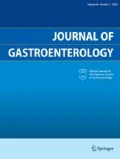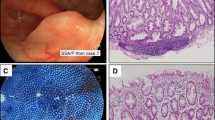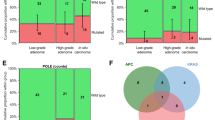Abstract
Background
Colorectal laterally spreading tumors (LSTs) are classified into LST-Gs and LST-NGs, according to macroscopic findings. In the present study, we determined the genetic and epigenetic alterations within colorectal LSTs and protruding adenomas.
Methods
A crypt isolation method was used to isolate DNA from tumors and normal glands of 73 macroscopically verified colorectal LSTs (histologically defined adenomas; 38 LST-Gs and 35 LST-NGs) and 36 protruding adenomas. The DNA was processed using polymerase chain reaction (PCR) microsatellite assays, single-strand conformation polymorphism (SSCP) assays, and pyrosequencing to detect chromosomal allelic imbalance (AI), mutations in APC, KRAS, and TP53, and the methylation of MLH1, MGMT, CDKN2A, HPP1, RASSF2A, SFRP1, DKK1, ZFP64, and SALL4 genes. In addition, methylation status was examined using the following set of markers: MIN1, MINT2, MINT31, MLH1, and CDKN2A (with classification of negative/low and high). Microsatellite instability (MSI) was also examined.
Results
5q AI and methylation of the SFRP1 and SALL4 genes were common molecular events in both LST-Gs and LST-NGs. Neither MSI nor mutations in BRAF ware observed in the LSTs. TP53 mutations were rarely found in LSTs. The frequencies of KRAS and APC mutations and the methylation levels of ZFP64, RASSF2A, and HPP1 genes were significantly higher in LST-Gs than in LST-NGs. Protruding adenomas showed alterations common to LST-Gs. Negative/low methylation status was common among the three types of tumors.
Conclusion
Combined genetic and epigenetic data suggested that the molecular mechanisms of tumorigenesis were different between LST-Gs and LST-NGs.





Similar content being viewed by others
References
Kudo S. Endoscopic mucosal resection of flat and depressed types of early colorectal cancer. Endoscopy. 1993;25:455–61.
Uraoka T, Saito Y, Matsuda T, et al. Endoscopic indications for endoscopic mucosal resection of laterally spreading tumours in the colorectum. Gut. 2006;55:1592–7.
Tanaka S, Haruma K, Oka S, et al. Clinicopathologic features and endoscopic treatment of superficially spreading colorectal neoplasms larger than 20 mm. Gastrointest Endosc. 2001;54:62–6.
Tamura S, Nakajo K, Yokoyama Y, et al. Evaluation of endoscopic mucosal resection for laterally spreading rectal tumors. Endoscopy. 2004;36:306–12.
Kudo S, Kashida H, Nakajima T, et al. Endoscopic diagnosis and treatment of early colorectal cancer. World J Surg. 1997;21:694–701.
Vogelstein B, Fearon ER, Hamilton SR, et al. Genetic alterations during colorectal tumor development. N Eng J Med. 1988;319:525–32.
Jass JR, Whitehall VL, Young J, et al. Emerging concepts in colorectal neoplasia. Gastroenterology. 2002;123:862–76.
Hasegawa H, Ueda M, Furukawa K, et al. p53 Gene mutations in early colorectal carcinoma, de novo vs. adenoma-carcinoma sequence. Int J Cancer. 1995;64:47–51.
Fujimori T, Satonaka K, Yamamura-Idei Y, et al. Non-involvement of ras mutations in flat colorectal adenomas and carcinomas. Int J Cancer. 1994;57:51–5.
Lengauer C, Kinzler KW, Vogelstein B. Genetic instability in colorectal cancers. Nature. 1997;386:623–7.
Toyota M, Ahuja N, Ohe-Toyota M, et al. CpG island methylator phenotype in colorectal cancer. Proc Natl Acad Sci USA. 1999;96:8681–6.
Goel A, Nagasaka T, Arnold CN, et al. The CpG island methylator phenotype and chromosomal instability are inversely correlated in sporadic colorectal cancer. Gastroenterology. 2007;132:127–38.
Sugai T, Habano W, Jiao Y-F, et al. Analysis of molecular alterations in left- and right-sided colorectal carcinomas reveals distinct pathways of carcinogenesis: proposal for new molecular profile of colorectal carcinomas. J Mol Diagn. 2006;8:193–201.
Ogino S, Goel A. Molecular classification and correlates in colorectal cancer. J Mol Diagn. 2008;10:13–27.
Japanese Society for Cancer of the Colon and Rectum. Japanese Classification of Colorectal Carcinoma, Second English Edition Tokyo: Kanehara Co., 2009; pp. 30–63.
Sugai T, Habano W, Nakamura S, et al. Genetic alterations in DNA diploid, aneuploid and multiploid colorectal carcinomas identified by the crypt isolation technique. Int J Cancer. 2000;88:614–9.
Boland CR, Thibodeau SN, Hamilton SR, et al. A National Cancer Institute Workshop on Microsatellite Instability for cancer detection and familial predisposition: development of international criteria for the determination of microsatellite instability in colorectal cancer. Cancer Res. 1998;58:5248–57.
Suzuki H, Itoh F, Toyota M, et al. Distinct methylation pattern and microsatellite instability in sporadic gastric cancer. Int J Cancer. 1999;83:309–13.
Yamamoto E, Suzuki H, Yamano HO, et al. Molecular dissection of premalignant colorectal lesions reveals early onset of the CpG island methylator phenotype. Am J Pathol. 2012;181:1847–61.
Sugai T, Habano W, Uesugi N, et al. Molecular validation of the modified Vienna classification of colorectal tumors. J Mol Diagn. 2002;4:191–200.
Kaji E, Kato J, Suzuki H, et al. Analysis of K-ras, BRAF, and PIK3CA mutations in laterally-spreading tumors of the colorectum. J Gastroenterol Hepatol. 2011;26:599–607.
Voorham QJ, Rondagh EJ, Knol DL, et al. Tracking the molecular features of nonpolypoid colorectal neoplasms: a systematic review and meta-analysis. Am J Gastroenterol. 2013;108:1042–56.
Umetani N, Sasaki S, Masaki T, et al. Involvement of APC and K-ras mutation in non-polypoid colorectal tumorigenesis. Br J Cancer. 2000;82:9–15.
Hiraoka S, Kato J, Tatsukawa M, et al. Laterally spreading type of colorectal adenoma exhibits a unique methylation phenotype and K-ras mutations. Gastroenterology. 2006;131:379–89.
Noro A, Sugai T, Habano W, et al. Analysis of Ki-ras and p53 gene mutations in laterally spreading tumors of the colorectum. Pathol Int. 2003;53:828–36.
Nosho K, Yamamoto H, Takahashi T, et al. Correlation of laterally spreading type and JC virus with methylator phenotype status in colorectal adenoma. Hum Pathol. 2008;39:767–75.
Spring KJ, Zhao ZZ, Karamatic R, et al. High prevalence of sessile serrated adenomas with BRAF mutations: a prospective study of patients undergoing colonoscopy. Gastroenterology. 2006;131:1400–7.
Caldwell GM, Jones C, Gensberg K, et al. The Wnt antagonist sFRP1 in colorectal tumorigenesis. Cancer Res. 2004;64:883–8.
Garcia-Manero G, Daniel J, Smith TL, et al. DNA methylation of multiple promoter-associated CpG islands in adult acute lymphocytic leukemia. Clin Cancer Res. 2002;8:2217–24.
Hesson LB, Wilson R, Morton D, et al. CpG island promoter hypermethylation of a novel Ras-effector gene RASSF2A is an early event in colon carcinogenesis and correlates inversely with K-ras mutations. Oncogene. 2005;24:3987–94.
Aguilera O, Fraga MF, Ballestar E, et al. Epigenetic inactivation of the Wnt antagonist DICKKOPF-1 (DKK-1) gene in human colorectal cancer. Oncogene. 2006;25:4116–21.
Habano W, Sugai T, Jiao Y-F, Nakamura S. A novel approach for detecting global epigenetic alterations associated with tumor cell aneuploidy. Int J Cancer. 2007;121:1487–93.
Young J, Biden KG, Simms LA, et al. HPP1: a transmembrane protein-encoding gene commonly methylated in colorectal polyps and cancers. Proc Natl Acad Sci USA. 2001;98:265–70.
Caldwell GM, Jones CE, Taniere P, et al. The Wnt antagonist sFRP1 is downregulated in premalignant large bowel adenomas. Br J Cancer. 2006;94:922–7.
Böhm J, Kaiser FJ, Borozdin W, et al. Synergistic cooperation of Sall4 and Cyclin D1 in transcriptional repression. Biochem Biophys Res Commun. 2007;356:773–9.
Chowdhury K, Goulding M, Walther C, et al. The ubiquitous transactivator Zfp-38 is upregulated during spermatogenesis with differential transcription. Mech Dev. 1992;39:129–42.
Sakamoto K, Tamamura Y, Katsube K, et al. Zfp64 participates in Notch signaling and regulates differentiation in mesenchymal cells. J Cell Sci. 2008;121:1613–23.
Wang C, Liu X, Liu Y, Zhang Q, et al. Zinc finger protein 64 promotes Toll-like receptor-triggered proinflammatory and type I interferon production in macrophages by enhancing p65 subunit activation. J Biol Chem. 2013;288:24600–8.
Konda K, Konishi K, Yamochi T, et al. Distinct molecular features of different macroscopic subtypes of colorectal neoplasms. PLoS One. 2014;9:e103822.
Yagi K, Takahashi H, Akagi K, et al. Intermediate methylation epigenotype and its correlation to KRAS mutation in conventional colorectal adenoma. Am J Pathol. 2012;180:616–25.
Kaneda A, Yagi K. Two groups of DNA methylation markers to classify colorectal cancer into three epigenotypes. Cancer Sci. 2011;102:18–24.
Sakai E, Ohata K, Chiba H, et al. Methylation epigenotypes and genetic features in colorectal laterally spreading tumors. Int J Cancer. 2014;135:1586–95.
Acknowledgments
We gratefully acknowledge the technical assistance of Miss E. Sugawara and Mr. T. Kasai. We also thank members of the Division of Molecular Diagnostic Pathology, Department of Pathology, Iwate Medical University, for their support.
Author information
Authors and Affiliations
Corresponding author
Ethics declarations
Conflict of interest
We declare that we have no conflicts of interest.
Electronic supplementary material
Below is the link to the electronic supplementary material.
Rights and permissions
About this article
Cite this article
Sugai, T., Habano, W., Takagi, R. et al. Analysis of molecular alterations in laterally spreading tumors of the colorectum. J Gastroenterol 52, 715–723 (2017). https://doi.org/10.1007/s00535-016-1269-y
Received:
Accepted:
Published:
Issue Date:
DOI: https://doi.org/10.1007/s00535-016-1269-y




